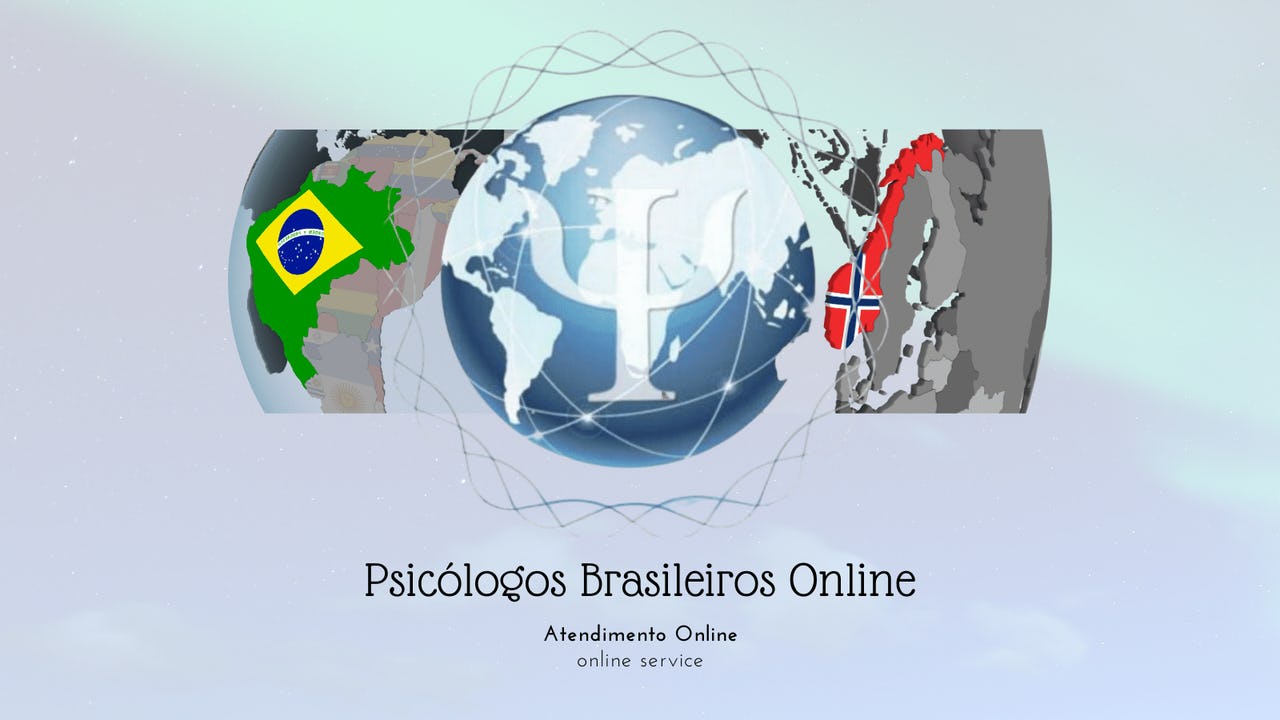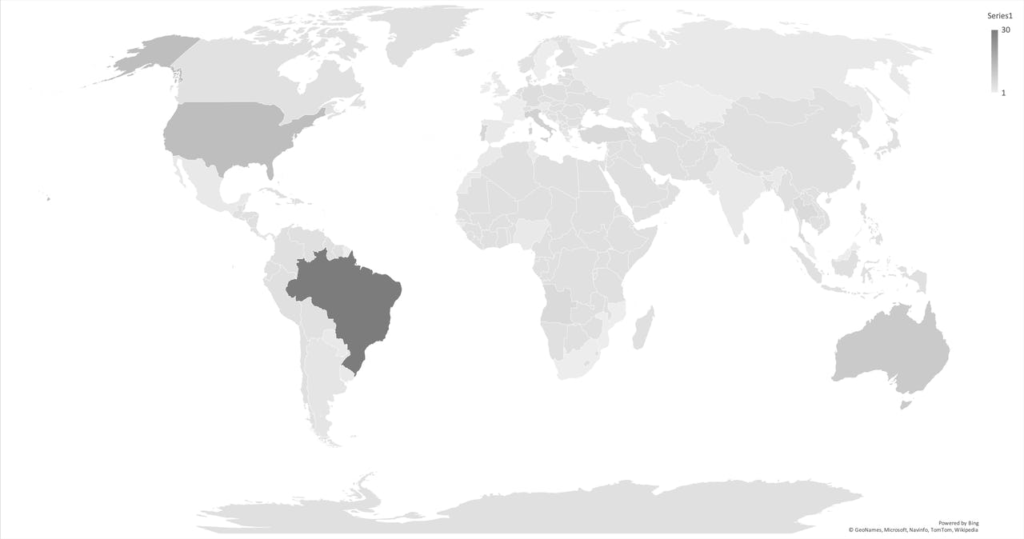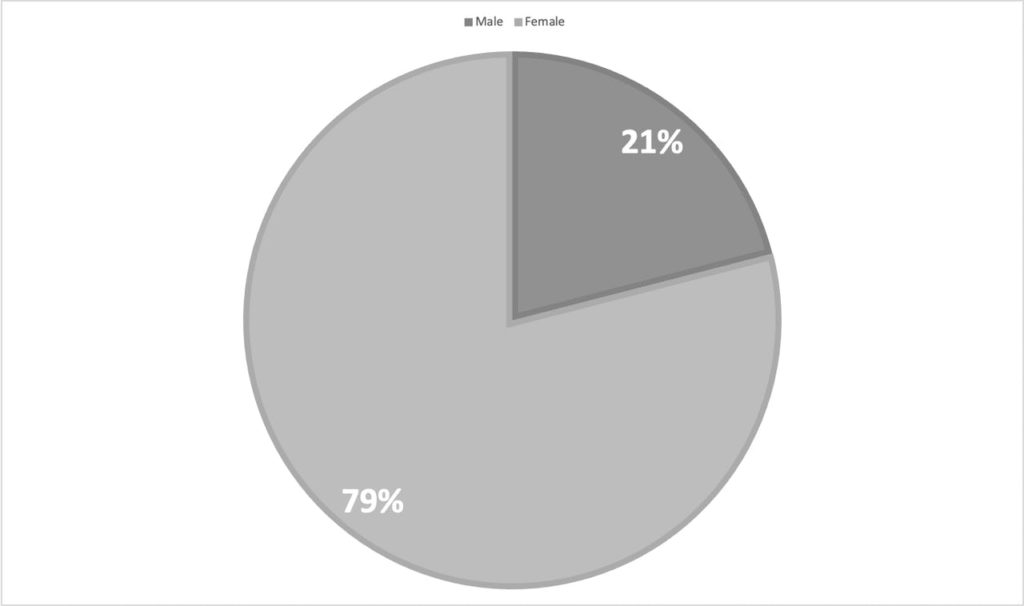Brazilians in the Arctic: A Global Experience with Mental Health during the COVID-19 Pandemic

The global network “Brazilian Psychologists Online” is an unprecedented and exclusive mental health care network for Brazilians living outside of Brazil and for their families in Brazil during the COVID-19 Pandemic. The network involves emergency, remote, voluntary psychological assistance with availability 24 hours a day, 7 days a week. Photo: Psicólogos Brasileiros Online
With the onset of the coronavirus (COVID-19) pandemic, the world has found itself in a global health emergency, which has caused a dramatic loss of human life worldwide and brought normal life around the world to a halt for the better part of a year. The Arctic Institute’s COVID-19 Series offers an interesting compilation of best practices, challenges and diverse approaches to the pandemic applied by various Arctic states, regions, and communities. We hope that this series will contribute to our understanding of how the region has coped with this unprecedented crisis as well as provide food for thought about possibilities and potential of development of regional cooperation.
The Arctic Institute COVID19 Series 2020-2021
- COVID-19 in the Arctic: The Arctic Institute’s Winter Series 2020-2021
- COVID-19 and Arctic Search and Rescue, our Duty to Act
- Vulnerable Communities: How has the COVID-19 Pandemic affected Indigenous People in the Russian Arctic?
- Brazilians in the Arctic: A Global Experience with Mental Health during the COVID-19 Pandemic
- COVID-19’s Impact on the Administration of Justice in Canada’s Arctic
- Isolation and Resilience of Arctic Oil Exploration during COVID-19: Business as usual or Structural Shift?
- COVID-19: How the Virus has frozen Arctic Research
- Rethinking Governance in Time of Pandemics in the Arctic
- Russia’s COVID Blinders: Arctic Policy Changes or Lack Thereof
- Geography of Economic Recovery Strategies in Nordic Countries
- Fly-in Fly-Out Workers in the Arctic: The Need for More Workforce Transparency in the Arctic
- Measures Taken by the Canadian Coast Guard to Respond to the Pandemic in the Canadian Arctic
- COVID-19 in the Arctic: Final Remarks
Russia, Finland, Norway, Greenland, Canada and the United States implemented a decree on travel restrictions during the COVID-19 pandemic.1) In addition to this, from the beginning of March 2020, when the global pandemic was recognized, Arctic governments closed schools and restaurants to promote social distancing and decrease the rate of infection. At that time, it was clear that limiting the exponential growth of infected people would be essential to protect vulnerable and immunocompromised citizens.2)
According to the Norwegian Psychological Association (NPF), isolation, fear of contamination, and economic uncertainty are factors that can contribute to mental illness.3) Thus, when people began to self-isolate in the spring of 2020, the psychological wellbeing of society was put at risk. As we know, maintaining relationships with those around us is “important in supporting people and providing resilience,”4) and it is important to make reasonable measures and public policies which ensure that patient care remains both safe and effective during these difficult times.5) The “Psicólogos Brasileiros Online” (Brazilian Psychologists Online) mental health network was created to support Brazilians outside of Brazil during this difficult time, and has provided emergency, remote, voluntary psychological assistance available 24 hours a day, 7 days a week, including people living in the Norwegian Arctic.
In the following sections, we will explore the importance of using technologies in favor of mental and emotional well-being, followed by a more detailed explanation of the “Brazilian Psychologists Online” support network, ending with a discussion and conclusion highlighting the importance of this network for the Brazilian community abroad, as well as the need for public policies to improve interrelations and synergy between countries, especially with regards to the relationship between the Arctic and Brazil.
Quarantine and mental illness
Studies from the International Labor Organization (ILO), released on March 18, 2020, estimated the expected number of job losses due to COVID-19 as 24.7 million jobs as a high scenario and 5.3 million jobs lost as a low scenario. In the high scenario, the world unemployment rate would increase from 4.936 percent to 5.644 percent, which would be associated with about 9,570 more suicides per year.6) In the low scenario, unemployment would increase to 5.088 percent, associated with an increase of about 2,135 suicides. According to the World Health Organization, each suicide in a population is accompanied by more than 20 suicide attempts.7)
Likewise, data from the 2008 economic crisis showed that the increase in suicides preceded the actual increase in the unemployment rate.8) According to the studies on the effects of unemployment on suicide, based on global public data from 63 countries, it was found that the risk of suicide increased by 20-30 percent when associated with unemployment during 2000-11 (including the 2008 economic crisis).9) In addition to the risks of suicide, social isolation imposed by the COVID-19 pandemic raises some worrying indicators about domestic violence and family violence against women. Organizations addressing domestic violence have already seen an increase in cases due to forced coexistence, economic stress, and fears about the coronavirus.10) Therefore, the number of people with mental illness seeking help from mental health services can be expected to increase in the context of the pandemic, for both locals and foreigners. In the case of Brazilians living in Norway and the Norwegian Arctic, the choice of psychological assistance has been outside of Norway and the Norwegian Arctic, often seeking an emotional closeness through the native language.
Motivated by the well-being of Brazilians living in Norway and the Norwegian Arctic, Celma R. Hellebust, a Brazilian lawyer residing in Stavanger, Norway, contacted psychologist Ana L. Gonçalves, a resident of Brazil, in March 2020 about the possibility of her helping Brazilians residing in Norway and the Norwegian Arctic on an emergency and voluntary basis. Gonçalves had experience in distance psychological assistance mediated by technology, and also an attentive awareness of the emotional disorders that social isolation can cause in people. With this, the creation of a working group was proposed with professionals from psychology, psychiatry, and infectious diseases. Initially, five Brazilian professionals volunteered to collaborate with the project.
Collaboration with the Ministry of Foreign Affairs of Brazil (Itamaraty) to introduce the service to the community, specifically with the Consular Crisis Group, which was established to assist Brazilians abroad and those affected by the new COVID-19 pandemic, resulted in the number of demands increasing significantly, as there were Brazilians in need of help in various places around the world. Consequently, the network was expanded, becoming a global support activity for the Brazilian community abroad, with approximately 80 Brazilian professionals collaborating today. Named “Brazilian Psychologists Online”, this an exclusive mental health care network for Brazilians living outside of Brazil and for their families in Brazil was created during the COVID-19 pandemic.
Mobile health technologies in favor of mental and emotional well-being
The World Health Organization (WHO) estimated that by 2030 depression will be the second leading cause of disability in individuals, preceded only by ischemic heart disease.11) The International Digital Mental Health Network (IDMHN) considers that “in the context of improving access to care and service quality, WHO recommends […] the use of electronics and mobile health technologies”.12) Videoconferencing has proven to be an efficient tool when applied by health professionals.13) With videoconferencing, communication between the patient and a psychotherapist is possible in real time, through a television, computer monitor, tablet, or smartphone.14) Telepsychology is crucial for psychological service provision, during the COVID‐19 pandemic more than ever, and that is unlikely to change as psychologists and patients increasingly continue to appreciate its value.15)
The global network “Brazilian Psychologists Online”
“Brazilian Psychologists Online” involves global emergency, remote, voluntary psychological assistance with availability 24 hours a day, 7 days a week. The team consists of mental health professionals and an infectious disease physician. The project is supported by the Ministry of Foreign Affairs (Itamaraty) to publicize information about the service with the embassies and consulates. The project is published on the social network pages of the consular offices, as well as on its own and the volunteer´s pages, in order to achieve a level of organic (unpaid) traffic through the networks. In the disclosure, a contact number for the project’s unique messaging application is provided.
The prospective patient makes contact through the application and receives the following consent form:
| The group PSICÓLOGOS BRASILEIROS ONLINE shall serve, during the COVID-19 pandemic, Brazilians who are outside the country. We shall also serve the families of these Brazilians, even if they are in Brazil. This service shall be free via WhatsApp video call and aims to promote care in the context of the pandemic and explore strategies for personal coping and seeking social support. It shall be a single encounter. Symptoms of mental illness due to the isolation, confinement, and stress of the moment have been increasingly common. Our group of professionals is able and willing to assist people who are emotionally affected by COVID-19, but are unable to care for patients with psychiatric demands. In this case, it is essential that you look for a local mental health service. This service is not classic psychotherapy, and it does not replace any treatment you are already following, whether psychiatric, psychotherapeutic or medical, for emotional and / or physical conditions prior to this date. Our group includes approximately 80 psychologists, all with active CRPs and committed to the requirements of the Federal Council of Psychology. Please reply via message with the following data: 1. I accept and am aware of the punctual nature of the conversation, and it is likely to be a single meeting. 2. Enter your full name: 3. Age: 4. Country and City that you are currently living: 5. How did you hear about this project? 6. What are the best times to attend according to Brasília time? Up to 24 hours after we receive your response, we will refer you to the WhatsApp number of one of the group’s professionals. If there is availability of a registered psychologist, you must contact the professional for the schedule. If this project is not suitable for your search, please say what you are looking for in a psychological service to see if we can help you in anyway. |
After receiving the data and agreeing to the terms of use for care, the patient is referred to a registered psychologist to schedule an appointment via video call. In this first contact, the psychologist performs a screening. The initial proposal is for a one-time video session, but it can be extended depending on the severity of the case.
It must be highlighted that this is a project that goes beyond individual service. In addition to voluntary patient assistance, the psychologists, psychiatrists, and the infectious disease physician actively participate in closed online group meetings to update people on the context of the pandemic. They provide advice on social networks, and make videos available on the project’s channel, helping the global virtual community.
The psychotherapist today is faced with the presence of new technologies, either through the impact they have on the subjectivity of patients and therapists with the creation of new types of care such as online consultations; or through new possibilities of distance contact with patients using social networks.16) The project created a closed online group where the professionals can interact, exchange information about the pandemic and discuss their experiences, in addition to the possibility of carrying out supervision and internal and external training. Although the professionals belong to various theoretical psychological approaches, what is really valued among the group is the possibility of helping Brazilians who are outside of the country.
Results
As of October 2020, 387 online consultations have been made, totaling 175 patients in 112 cities across 40 countries. As can be seen on the map below, the network served the Brazilian community on five continents: Africa, the Americas, Asia, Europe, and Oceania. The countries with the greatest number of people served, after Brazil, were England (22 patients), the United States (13 patients), and Australia (10 patients).

In Arctic countries, 52 online consultations have been made, totaling 24 patients from 5 countries, namely: the United States (13 patients), Canada (4 patients), Norway (4 patients), Russia (2 patients), and Sweden (1 patient).
Regarding the distribution by sex of the patients served by the project, the graph below shows that most of the patients treated by the project were female.

There was no statistical difference in the average number of consults by gender (female: 2.16 sessions, male: 2.20 sessions). The average age of patients seen was 34.9 years; 35.9 years for females and 31.3 years for males. There was no statistically significant difference between age groups.
Conclusion
The COVID-19 pandemic has worsened the world population’s mental health. The need to maintain social isolation associated with the need to support people, made it necessary to seek a solution.
Through the coordination of “Brazilian Psychologists Online”, a group of psychologists has been able to offer support to many of those in need. This innovative network differentiates itself because it is emergency, remote, voluntary psychological assistance with availability 24 hours a day, 7 days a week, available for Brazilians abroad, and their family members who are in Brazil. In addition, it is composed of professionals from various areas of mental health.
This work has highlighted the importance of working on public policies for foreigners living within the Arctic region and continuing this project so that people living abroad can be instructed about the local system and how to proceed during stressful times.
It is likewise important to note that this network is not an internet treatment but rather an emergency support service so that people can have greater knowledge on how to deal with pandemic-related situations in their daily lives. Since its inception, the network has observed that many people lack experience dealing with stressful situations when abroad. Thus, the objective is to reduce the stress of the patient, which will lead to better health and welfare. This will insure greater resilience in the society in which they operate.
Celma Regina Hellebust is a lawyer and has a Master in Societal Safety from the University of Stavanger, Norway. She is a member of the Brazilian and Norwegian Bar Association (Ordem dos Advogados do Brasil and Den Norske Advokatforeningen). Hellebust has participated as speaker in Arctic Circle Assembly in Iceland 2016-2017 and also in 2019 editions. Ana Lúcia Gonçalves is a psychologist. She graduated from the University of São Paulo – USP, Ribeirão Preto, Brazil. She is a member of the Psychologist Council in Brazil and a specialist in traffic psychology and psychopedagogy. Victor Barros is an assistant professor at the University of Minho, Portugal; researcher in the Algoritmi Centre, Portugal; and researcher in the Laboratory of Technology and Information Systems (TECSI), University of São Paulo (Brasil).
References